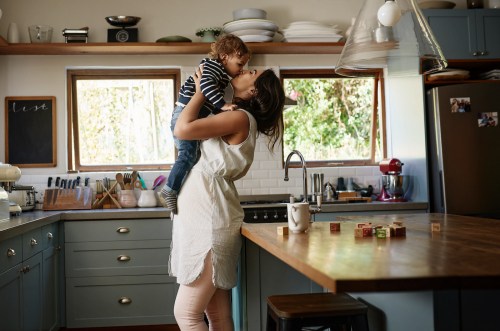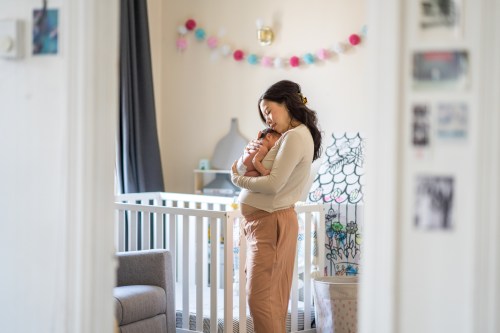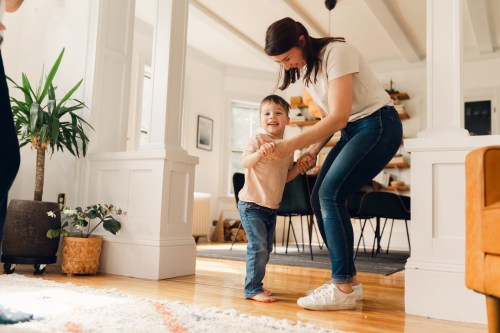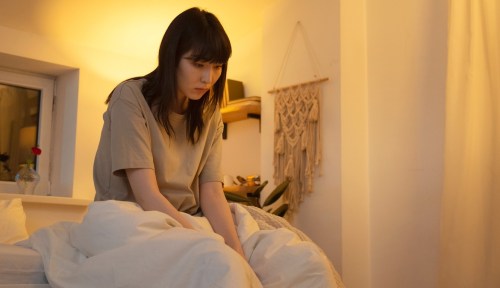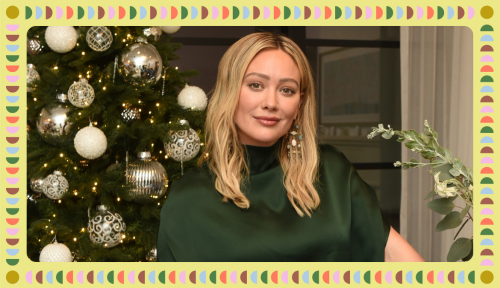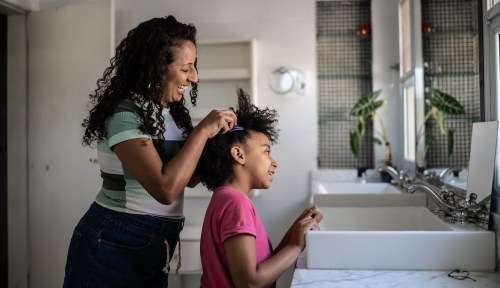The ticking clock. The phrasing is outdated (smartwatches and phones have pretty much replaced anything that ticks) but the idea of a biological ticking clock still haunts many people of a certain age—at least those who want to have kids. According to a 2019 Pew Research study, the desire to have kids is still one of the driving reasons why people want to get married; 49 percent of people surveyed cited it as “very important” factor.
Experts in This Article
Christine Grange, PhD, is a clinical psychologist and an associate professor of psychology at Clayton State University.
Jane Mattes is a psychotherapist and the founder of Single Mothers By Choice.
A growing awareness that you don’t need to have a partner in order to become a parent, however, is changing this narrative—including for people who are deciding to become single parents by choice in their 20s, well before the “ticking clock” enters the conversation. In the spring of 2021, the reproductive health company Modern Fertility and wedding registry website Zola surveyed thousands of people about their timelines for marriage and having kids and found that 27 percent of respondents agreed with the statement: “I don’t feel like I need a partner to become a parent.” To the researchers, this indicates “more openness to ‘single parent by choice’ as a parenting path.”
Interviews with those who have chosen to become parents without a partner and researchers in this space not only support that assertion, but reveal how greater visibility for this group is helping to break down stigmas regarding the choice and offering a window through which others can see what taking this step can look like in action. For many people who have been conditioned to see having a child before getting married—or even being in a committed relationship—as taboo, this can be especially eye-opening… and, potentially, life-changing.
A decision sparked—and made easier—by the pandemic
Kelly*, who is 38 and currently five months pregnant, says becoming a parent is something she’s been thinking about for a long time, and she decided to actively pursue it during the pandemic. “During COVID-19, I’ve had so much more alone time, which gave me the space to think about it more seriously,” she says. “Before the pandemic, I was so over-scheduled that I never allowed myself the time to slow down and think about what I really wanted and how to take action.”
While Kelly says she would like a partner in the future, she decided she didn’t want not finding the right person to postpone her dreams of becoming a mom. She started researching all the different ways someone can become a parent without a partner, including in vitro fertilization (IVF), adoption, and fostering (a temporary arrangement in which adults provide for the care of a child or children whose birth parent is unable to care for them). Ultimately, she says she decided to pursue IVF. “I felt a very strong pull to start my family with a child I was biologically related to,” she says. Having the financial resources to devote to the process also factored into her decision.
The more she started talking to friends and family about what she hoped to do, the more she learned that the decision to become a single parent by choice actually wasn’t all that unusual in her circles. “Several of my friends had actually started their family this way, by pursuing motherhood and then finding a partner later,” she says. “I had always just assumed it was the other way around, but once I started to see what it looked like in other people’s lives, it really solidified my decision to do it.”
“Several of my friends had actually started their family this way, by pursuing motherhood and then finding a partner later. I had always just assumed it was the other way around.” —Kelly, a single parent by choice
Kelly’s next step was booking an appointment with a fertility specialist at Modern Fertility to see if IVF could even be an option for her. “As women, our fertility isn’t something that [typically] gets checked at our yearly gyno appointments, so I had no idea what my fertility actually was,” she says. At her appointment, she found out that if having a biological child was something she truly wanted, sooner was better than later. So, Kelly moved forward. “Working from home in my leggings definitely made the IVF process easier than trying to give myself injectable medications while wearing business clothes and being in the office,” she says.
While Kelly says her friends and family have been overwhelmingly supportive of her decision to pursue solo parenting, due to COVID-19 restrictions, she’s gone through the process largely on her own. Her mom picked her up from the hospital after procedures that required anesthesia, but Kelly gave herself the injectable medications needed to get her body ready for the egg retrieval process. She went alone to her appointments for retrieving the eggs and then implanting them.
“The ‘holy crap, I’m really doing this’ moment for me was the embryo transfer,” Kelly says. “The first part of the process is the egg retrieval, and I viewed that as creating options for myself. The eggs could sit in a freezer for however long I wanted to pay for them to be there. Then, they are fertilized, and after that, they are transferred into the uterus. If it works, I’d become pregnant. That was a real moment for me, but it wasn’t one I was freaked out by. I felt excited to be starting my family, not worried.”
Reasons why people are pursuing single parenthood
Jane Mattes, LCSW, is a psychotherapist and the founder of Single Mothers By Choice, a non-profit for women who are thinking about or pursuing single parenthood. Mattes says she founded the organization in 1981, shortly after becoming a single parent herself. “I had a wonderful family and friends, but I realized I needed more of a support system, so I started asking to be connected to more single mothers by choice just through word of mouth,” she says. Because this was before the Internet, her new social network of solo parents communicated through snail mail. Mattes connected people in the group with each other and, over the decades, the network has grown to over 30,000 members. Now, there are local chapters where Single Mothers By Choice members can meet up in person in addition to connecting on the site.
Mattes says she’s witnessed more people becoming single parents by choice through the growth of the organization. “I think the main reason for it is that more [people] are realizing that it’s an option,” she says. “People often share in the community that they never thought this was a lifestyle choice that was available for them before. For so long, women were told, ‘You can’t raise a child without a father,’ and that was stated as a fact in the media by many people—particularly men—in positions of authority.”
She also says she’s seeing a shift in the age of people who are becoming single parents by choice. “Before, members were mostly 35 and older, but now, there are many more people in their 20s who are what we call ‘serious thinkers,’ which means they really want to consider single parenthood and do it,” Mattes says.
For Kelly, having the space to think about and pursue IVF during the pandemic played a crucial part in her solo parenting journey. But as she mentioned, she was also tired of waiting to find the perfect person to settle down with first. And she’s far from the only one. Simply put, dating is hard. According to Pew Research, 75 percent of single adults describe dating as very difficult. Two-thirds of those who are single and looking for a relationship or dates say their dating life is either going not too well or not at all well.
As this data and Mattes’s observations show, more people are having trouble finding a partner they can see themselves having kids with. They’re also seeing examples of what being a single parent by choice looks like in action. And that combination is shifting parenthood as we know it.
Single parenthood through fostering and adoption
Bethany Anne Moore, a single foster parent and adoptive parent of three, says she’s always had the desire to get married and have a family, but like Kelly, she reached her mid-20s still searching for the perfect partner. “I’m a teacher and there were several foster children in my class, which really humanized foster care for me,” she says. “I realized how important having good foster parents was.” When she was 26, she decided to become a foster parent herself. “I had a house and income. It was something I could really do.”
Initially, Moore was solely focused on fostering. But when the opportunity to adopt one of her placements presented itself, she says she felt it in her heart to do it. Now, she’s adopted three kids through foster care. When she started fostering, Moore didn’t know any single foster or adoptive parents, but she quickly found others through social media. “There’s a whole big community out there that makes you feel not alone,” she says.
Like Moore, Elizabeth Friedland is also a single foster and adoptive mom. She says that she was initially drawn to fostering because she wanted to experience motherhood without necessarily committing to it permanently. Friedland began fostering when she was 33, knowing that it’s meant to be temporary and the ultimate goal is to reunite foster children with their biological family.
Jack, now her son, was her fifth placement. “I fell in love with him from the second I laid eyes on him,” Friedland says. When the opportunity to adopt him arose, she wholeheartedly said yes. “Adoption through foster care is always heartbreaking because it means the birth parents give up their rights, and there’s tragedy and trauma connected to that,” she says. “But I was thrilled at the chance to be his forever mom,” she says. (She also recently adopted a baby girl.)
Friedland says when she initially began fostering, she didn’t know any single foster parents—she didn’t know any single moms, period. But through social media, she’s become connected to both single foster parents and single adoptive parents. “I think because of social media, there’s become more awareness that this is something you can do on your own, if you want to,” she says. “A lot of people think to foster or adopt you have to be in a heterosexual, committed relationship, or own your own home, and none of that is true.” In an effort to address these misconceptions and answer common questions people have about fostering and adoption, Friedland launched a podcast in which she shares her experience and provides a platform for other single foster and adoptive parents to share theirs.
Friedland says she’s also part of a closed Facebook group of single foster and adoptive parents with almost 6,000 members. Like Mattes, she says she’s noticed a shift in many women in their 20s starting to pursue single parenthood; they are seeing others do it and start visualizing what their life could look like in this way, too.
The stigma of single parenthood
It’s important to acknowledge that single-parenthood still a stigma attached to it. In a 2015 Pew Research Center survey, two-thirds of adults said that more single women raising children on their own was bad for society. Moore says it’s a viewpoint many still have and that she’s regularly confronted with. “I’m a Christian and when I started fostering as a single person, I thought everyone would be supportive because it’s a way to help others. But many people have told me that they think what I’m doing is sinful and that God wants kids to be raised by a husband and wife,” she says. “There is a lot of criticism out there.”
In a 2015 Pew Research Center survey, two-thirds of adults said that more single women raising children on their own was bad for society.
Christina Grange, PhD, an associate professor of psychology at Clayton State University who studies unmarried Black parents, says this stigma is even stronger for Black women. (Dr. Grange is also an unmarried parent, a term she says is more accurate in relation to her life because she has a partner who is a co-parent.) “In my clinical work, I see many Black women struggling with the term ‘single parent’—especially after they’ve left a relationship—because of the negative stigma associated with it,” she says. “There’s a stigma that Black single mothers have made ‘bad choices,’ are unable to take care of themselves financially, and are sexually promiscuous.”
Dr. Grange says this is not only an unfair and problematic viewpoint, it’s an inaccurate one. Mainstream American culture may be changing to be more accepting of single parents by choice, but cultural change is slow, and as Dr. Grange points out, BIPOC (Black, Indigenous, and people of color) individuals face harsher judgments than their white counterparts.
She also points out that portrayals of single parenthood in the media vary by race. “In Hollywood and in the media, there’s a kind of glamorizing of white women who have kids independently. But that same treatment isn’t given to Black women,” Dr. Grange says.
Despite the stigma, Mattes—who is a psychotherapist—says just because a child is being raised by one parent instead of two doesn’t mean they are lacking in love or support.”One of my great hopes is to break the myth that it takes two people to be good parents,” she says. “This is a huge misconception.”
What matters most, Dr. Grange and Mattes say, is having a support system as well as adequate financial resources. Both experts say this support system can come in the form of family, friends, houses of worship or religious groups, and social networks like the ones Moore and Friedland are a part of.
Both Friedland and Moore emphasize that single parenthood isn’t easy. “The hardest part for me is the loneliness,” Moore says. “Also, being a foster parent means dealing with a lot of heavy things emotionally, and it would be nice to have someone to share that with.” Both say logistically and financially, it would be easier to have a partner. But neither says they regret their choice.
As for Kelly, though she’s at the very start of her parenthood journey, she says she feels empowered with her decision. “Finding a partner for the primary purpose of creating a family creates a lot of pressure, which I don’t think is fair to anyone,” she says. “I have the resources to create a great home for our family, whether or not I have a partner. I feel so much stronger because of this.”
*Last name has been withheld to protect her privacy.
Oh hi! You look like someone who loves free workouts, discounts for cult-fave wellness brands, and exclusive Well+Good content. Sign up for Well+, our online community of wellness insiders, and unlock your rewards instantly.
Sign Up for Our Daily Newsletter
Get all the latest in wellness, trends, food, fitness, beauty, and more delivered right to your inbox.
Got it, you've been added to our email list.
